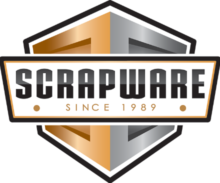Scrap metal recycling is all about saving natural resources. What if scrap metal recyclers could reap the benefits of conserving an additional natural resource–paper? More scrap metal recycling businesses today are moving toward paperless processes to streamline business practices, thus saving time, money, and yes, natural resources.

Transitioning from paper to digital documents is an important step in the digital transformation most companies say they want to eventually achieve.
Putting in place new systems to achieve this goal requires planning and investment. So, what are the benefits of evolving into a paperless business? As a mechanism to save time and money, the individual benefits of going paperless are numerous. A Forbes blog post last year, “Going Paperless: A Journey Worth Taking,” compiled the benefits of going paperless into these general categories:
- Streamline and Accelerate Important Business Processes: Digital documents can be moved from person to person more quicky than paper documents. They can be viewed by many people at the same time. Mistakes are more easily and quickly caught and corrected.
- Simplify Interactions with Vendors and Customers: With online documents, customers and vendors can access them when it is convenient and address them from any location. They can sign paperwork digitally and print copies when and if they are needed. Having a paperless option for your customers and vendors improves their experience with your business.
- Make Finding Documents Faster and Easier: If documents are stored digitally, it is easier to find them online instead of digging through file drawers. Answers to inquiries from customers, vendors, government entities and staff are available at everyone’s fingertips.
- Save Time: Electronic documents are faster (and cheaper) than paper documents to edit, change and redistribute to customers, vendors and employees. This cuts down on bottle necks in your business process and reduces the time of approval cycles.
- Protect Documents: If documents are electronic, they are protected from getting lost or damaged from a disaster like fire, flood or theft.
- Improve Security: Confidential data or sensitive information is much more secure stored as an electronic document on an off-site cloud server.
Save Money and Physical Storage Space: The improvements in these processes lead to cost savings. They also save physical storage space and clean up clutter, eliminating the need for rooms full of file cabinets.
In addition, scrap metal recyclers can also benefit from improved compliance with state and local laws. Having stored digital images of licenses, signatures and fingerprints can help companies comply with anti-theft regulations, work with authorities and protect themselves from mistakes.
The magnitude of benefits has accelerated the movement to paperless processes today. Nonetheless, the prospect of going completely paperless can seem overwhelming, and in some cases, impractical or unnecessary. The good news is that no company has to go paperless overnight–or ever go completely paper-free–to reap the benefits of transforming some paper-based practices to paperless ones. Progress can be made in smaller, incremental changes.
Below is a list of some steps scrap metal recycling companies can take to reduce their reliance on paper transactions:
- Store documents and files digitally, in the cloud: Important files and documents can be saved and accessed anytime using online storage. Automatic data backups will make sure information stored online is not lost. Storing documents in the cloud allows files to be shared among employees, customers and vendors from wherever they are at any time, with all users having access to the information remotely. Finally, cloud storage is scalable, meaning storage capacity can be increased or decreased as the needs of a business grow or change.
- Use electronic communication: Almost everyone now uses e-mail in many instances to replace regular mail, but other types of electronic communication may also help reduce paper and improve efficiency. For example, Instant Messaging platforms like Skype or Slack can be used among employees to improve efficiency and convenience for internal communication. A company can request electronic billing from vendors such as utilities or use electronic invoicing for customers. Electronic calendars can replace paper calendars and facilitate better scheduling of meetings and calls among employees at the same time.
- Copy documents with scanners and apps: As a company seeks to decrease the volume of paper in its office, existing important documents can be scanned and uploaded for digital storage. In addition to scanners, many phones and tablets now can use apps that let users scan documents using their own devices.
- Move financial transactions to the digital realm: Digital receipts, direct deposit and other electronic financial transactions are cheaper and safer than paper and checks, and they are easier to track for bookkeeping purposes. Issuing electronic invoices with online payment options usually results in getting paid more quickly.
- Use e-signatures: Signing contracts and agreements no longer requires printing out long documents to obtain a few signatures. E-signatures are legally binding, but are significantly more efficient, convenient, faster to use, safer and more secure than obtaining a traditional signature.
For scrap metal recycling businesses, ScrapWare Corporation offers a software package that facilitates the use of e-signatures for all contracts and documents.
Last year, ScrapWare teamed up with DocuSign, the industry leader in electronic signatures, to allow ScrapWare users to employ e-signatures in their cloud-based software product, which is specifically designed for scrap metal recyclers.
While going completely paperless might not be practical for everyone, incremental improvements can be made by adopting some paperless practices to save your company time and money.
ScrapWare Corp., of Rockville, MD, has been providing software to the scrap metal recycling industry for over 30 years. ScrapWare uses an Oracle database to provide a cloud-based software solution to manage all aspects of a recycling business. With numerous modules, extensive technical support, remote installation and online training, ScrapWare helps recycling companies with compliance, efficiency and profitability. Check out ScrapWare’s website, read the user testimonials, and see its offerings for your recycling software solution.
